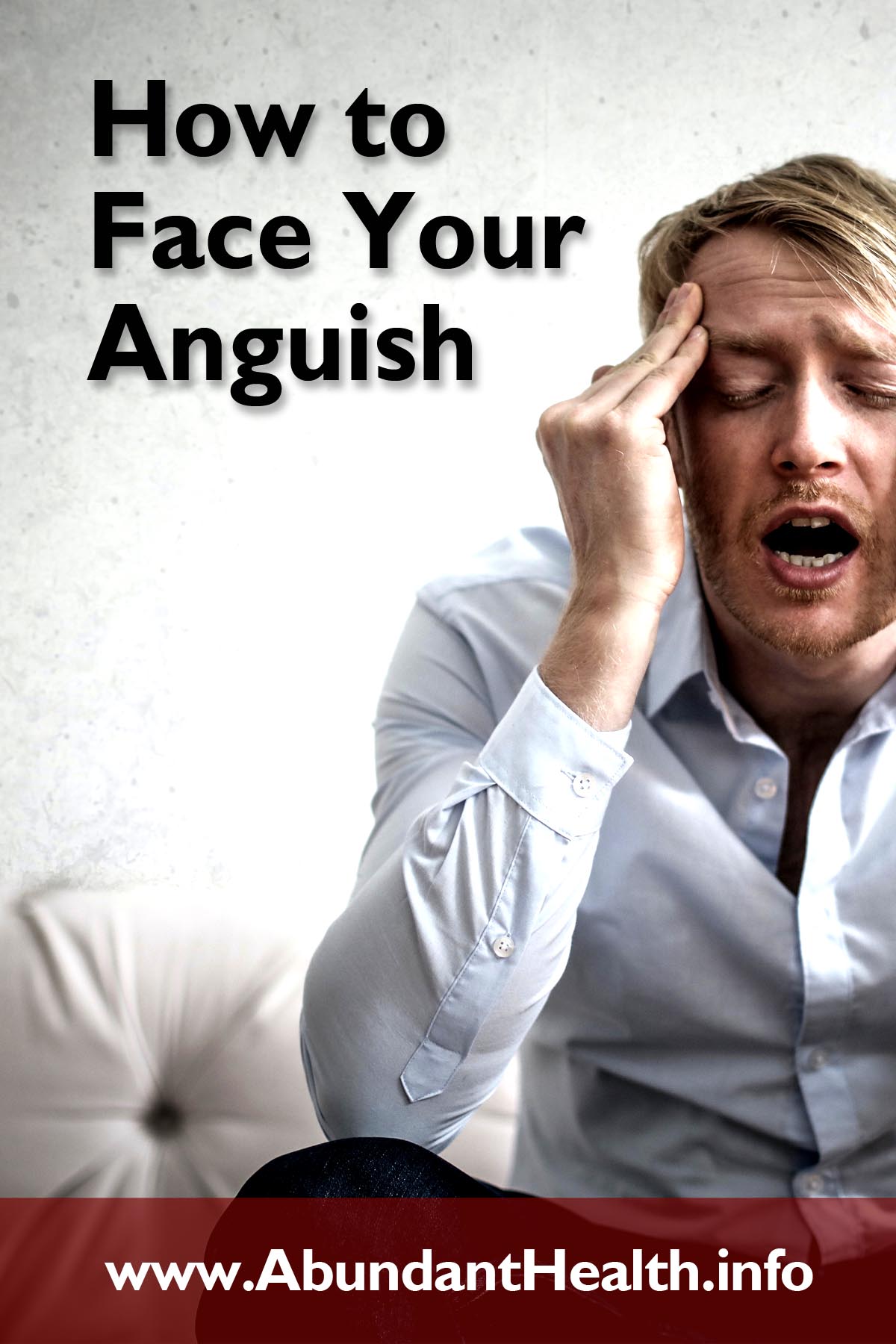Anguish is very common in our society. It is a feeling of intense pain, whether physical or emotional. In the midst of difficulty and anguish it can be difficult to perceive what to do. But anguish does not come from nothing, there is a reason for it to appear. How can we handle anguish?

David was a shepherd who became a king in Israel in Old Testament times, but he screwed up a lot. I’ve heard preachers say that even when David committed adultery and murder, he was a man after God’s own heart. The truth is that David became a man after God’s own heart after he deeply regretted his sins, especially adultery and murder. Up to a certain point he tried to stifle his anguish over the mistakes he had made. Let’s think now about what we do with anguish. Do we run away from it, or are we able to face it in the strength of God?
The Bible is a wonderful book because it shows the truth of human history, without putting a lid on anyone. David was carried away by emotion, by sensuality, and abusively he wanted to have the wife of one of his army chiefs, Uriah. He ordered to put Uriah – his faithful soldier – at the head of the battle and to leave him there alone, so he was slain in battle.
It was cowardice on the part of David and his officers who carried out this order. David wanted to stay with Uriah’s wife, Bathsheba. He adulterated and murdered one of their military leaders. He didn’t think about it anymore, he fled into denial, into self-deception. Many do this, they escape into a mental attitude of unconsciousness of guilt, in the cruel, unpleasant, rude way of being. Running away from yourself can be the worst escape to do.
Then the Prophet Nathan, sent by God, went to David and told him a parable that portrayed injustice. When David heard the story of the parable, he immediately said that the unjust character must be punished. Nathan then said that he, David, was the unjust man, for what he had done to Bathsheba and Uriah. Suddenly the penny dropped and David came out of denial and admitted his mistakes, facing his anguish head on.
It seems difficult for certain people to admit their mistakes in behavior. Sometimes they are authoritarian, bossy, boastful, arrogant people. It’s hard to get along with people like that who, like David, are in denial almost all the time, always making an excuse for their abusive behavior.
There are people who do not feel anguish, because they have a strong ego and a good ability to manage their emotions. But a person with an impoverished emotional make-up, or someone alienated, may not complain of anguish.
Another type of person who seems to lack conscious distress is one who lacks self-observation. They can be defensive people, who don’t open up, they think they are powerful because they are more affluent, or with some relevant political, business or social position, or because they are people soaked with emotions, and with that they believe they have the power to love. Mature love involves feeling, but a strong feeling alone is not love.

Why do some deny having behavioral problems? Why don’t they observe themself and admit it? Maybe because they didn’t want to face their anguish. One way to avoid thinking about your anguish is to criticize, wanting to control others and having an attitude of ordering as if others were your stewards. Nor does one feel anguish who suffers from a decrease in morals. Corrupt people are like that. Some corrupt people may have a personality disorder, because they lack remorse, lack the feeling of guilt, lack true repentance. Those who say they don’t have anguish, may not have symptoms, but the way they live, trampling on ethics, exploiting people, dominated by material greed, aren’t these the symptoms of a character deficiency?
Another way to escape the perception of anguish has to do with psychosomatic illnesses, which are the manifestations of anguish through the body. This is where autoimmune diseases and other symptoms in the body come in, for which there is no diagnosis of some organic clinical disease. Is the absence of perceiving anguish the same as the absence of symptoms? Who doesn’t feel anguish consciously doesn’t have symptoms of emotional suffering?
Some symptoms may not be so evident, that they are expressing the presence of anguish or exaggerated anxiety. For example, stuttering, the presence of a tic, nocturnal enuresis that makes the person wet the bed again, obesity, verbal aggression, consumerism, a sex craving, an addiction to work, among others.
Anguish affects the entire human race. A baby is already born with it. Anguish is a general malaise, an unpleasant feeling of emptiness, of missing something that you don’t know what it is. It feels like a hole in the chest, sometimes a feeling of tightness, oppression in the chest, a lump in the throat, with or without sadness. Sometimes, and perhaps most of the time, anguish comes in disguise, or hides itself in physical symptoms, or even in mental symptoms such as panic attacks, bulimia, self-mutilation, obsessive compulsive disorder, drug addiction, among other problems.
Dealing with anguish is not easy. We all want pleasure, well-being, and that’s a normal desire. But is it possible not to have anguish in this existence? Is there any medication that eliminates the anguish inherent to existing? Any drug, licit or illicit, only promises resolution of anguish, but does not fulfill it, unless temporarily, and depending on the drug in a very fleeting way. The pain comes back.

To better deal with your anguish, it is important to observe what types of thoughts you cultivate the most in your mind. Imagine a car with four wheels. The front wheels are the most important because they get you where you want to go. The rear wheels follow the front ones. The ones at the front are thought, cognition, choice, volition. The ones behind are feelings and physiology; that is, how your body reacts depending on what you think, what you feel and what you do.
To deal with anguish and depression it is important to consider the front wheels: thinking, choice. People who let their thoughts focus on tragedies, pessimism, and personal suffering can develop a variety of mental disorders. Studies of depression reveal that distorted and hopeless thoughts contribute and worsen depression.
The rear wheels are still important. Without them, the front ones can’t handle the path you want to go. Feelings are important for the functioning of the brain and other organs. Most people tend to be either at the extreme of being dominated by feelings – the front wheel of thought comes to the back, and the back wheel of feeling comes to the front – or they repress emotions too much, taking off a rear wheel.

There are not many who manage their thoughts and feelings well. It depends on learning, which I call psychoeducation. That’s where you learn to think better by correcting your distorted thoughts, to focus your attention on what works in your life instead of what doesn’t, to cultivate hope, to strive to be optimistic, to have and express gratitude, to overcome authoritarianism and to cultivate meekness, stop complaining about people, about life, about everything; this is psychoeducation.
When you let thought go to the back wheel and allow the back wheel of emotion to come forward, choices, behavior, your family and social relationships can become problematic. Not because feelings are a mistake, but because common sense, serenity, mental balance, are not produced by feeling; this is not their job. It is cognition, thought, one of the front wheels that is enabled to do this. Taking medication for anguish and depression and not learning to think better is like wanting the back wheel to guide the car of your mind.
Do something to learn how to better deal with your emotions, with your anguish or sadness. Psychotherapy, good reading, lectures, counseling, spiritual retreats, support groups, Bible reading, life can help. Once you learn to control your thoughts, emotions and everything else, you’ll move on more easily.

Stay Always Up to Date
Sign up to our newsletter and stay always informed with news and tips around your health.

Dr. Cesar Vasconcellos de Souza is working as a psychiatrist and international speaker. He is author of 3 books, columnist of the health magazine “Vida e Saúde” for 25 years, and has a regular program on the “Novo Tempo” TV channel.
Leave a Reply